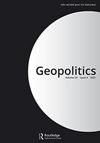Shaping the Eurasian Gas Market: The Geopolitics of Energy Market Regulation
IF 3.4
1区 社会学
Q1 GEOGRAPHY
引用次数: 0
Abstract
ABSTRACT The common characterisation of European Union (EU) and Russian external energy relations as liberal versus realist does not do justice to the efforts of both entities to shape energy market regulation in their shared neighbourhood. This article aims to contribute to the understanding of energy regulation as a tool of strategic influence by examining from a geopolitical perspective how the EU, Russia and, to a lesser extent, China attempt to shape gas pricing and pipeline access regimes in the post-Soviet Eurasian space. A geopolitical analysis of regulatory convergence in the region helps understand how liberal concepts of energy regulation acquire a strategic function when exported to contested spheres of influence, with important consequences for the legitimacy and acceptability of these regulatory models. The EU, Russia and China recognise common principles of gas market regulation at the domestic level, but geopolitical considerations, exacerbated by the war in Ukraine, prevent the implementation of these principles at the regional level, hindering the transition of this contested neighbourhood towards more efficient energy systems and reduced dependence on Russian supplies.塑造欧亚天然气市场:能源市场监管的地缘政治
ABSTRACT 欧洲联盟(欧盟)和俄罗斯的对外能源关系通常被定性为自由主义与现实主义的关系,但这一定性并没有公正地反映两个实体在其共同邻近地区塑造能源市场监管的努力。本文旨在从地缘政治的角度探讨欧盟、俄罗斯(其次是中国)如何试图在后苏联时期的欧亚地区形成天然气定价和管道准入制度,从而加深人们对能源监管作为战略影响工具的理解。对该地区监管趋同的地缘政治分析有助于理解自由主义能源监管概念在输出到有争议的势力范围时如何获得战略功能,并对这些监管模式的合法性和可接受性产生重要影响。欧盟、俄罗斯和中国在国内层面承认天然气市场监管的共同原则,但乌克兰战争加剧的地缘政治因素阻碍了这些原则在地区层面的实施,阻碍了这一有争议的邻国向更高效的能源系统过渡,减少了对俄罗斯供应的依赖。
本文章由计算机程序翻译,如有差异,请以英文原文为准。
求助全文
约1分钟内获得全文
求助全文
来源期刊

Geopolitics
Multiple-
CiteScore
7.60
自引率
10.30%
发文量
50
期刊介绍:
The study of geopolitics has undergone a major renaissance during the past decade. Addressing a gap in the published periodical literature, this journal seeks to explore the theoretical implications of contemporary geopolitics and geopolitical change with particular reference to territorial problems and issues of state sovereignty . Multidisciplinary in its scope, Geopolitics includes all aspects of the social sciences with particular emphasis on political geography, international relations, the territorial aspects of political science and international law. The journal seeks to maintain a healthy balance between systemic and regional analysis.
 求助内容:
求助内容: 应助结果提醒方式:
应助结果提醒方式:


